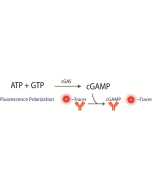Cookie Policy: This site uses cookies to improve your experience. You can find out more about our use of cookies in our Privacy Policy. By continuing to browse this site you agree to our use of cookies.
BellBrook
Transcreener UDP2 FP Assay

| Product Details | |
|---|---|
| Product Type | Kit |
| Properties | |
| Application Set | Compound Screening |
| Crossreactivity | All |
| Quantity |
1000 assays/384wells (BBL-3018-1K) 10000 assays/384wells (BBL-3018-10K) Note: The exact number of assays depends on enzyme reaction conditions. |
| Sensitivity | Excellent data quality (Z’ ≥ 0.7) at low substrate conversion (typically 10-30%). |
| Range | Accommodates UDP concentrations ranging from 1 μM to 1,000 μM. |
| Detection Type | Fluorescent polarization |
| Kit Contains |
UDP2 Antibody, UDP Alexa Fluor® 633 Tracer, Stop & Detect Buffer B, 5X, UDP Note: The plates are not included, please see manual for material not provided but necessary for assay. |
| Other Product Data |
Click here for Complete Information from the Original Manufacturer
Easy-to-Use (mix-and-read method).Simple homogenous biochemical assay. Direct detection of UDP eliminates laborious coupling steps. HTS Compatible with 96, 384, and 1536-well plates. Outstanding deck and signal stability. Excellent sensitivity. |
| Declaration | Manufactured by BellBrook Labs. |
| Shipping and Handling | |
| Shipping | DRY ICE |
| Short Term Storage | -20°C |
| Long Term Storage | -20°C |
| Handling Advice | Avoid freeze/thaw cycles. |
| Documents | |
| Manual |
 Download PDF Download PDF |
| Product Specification Sheet | |
| Datasheet |
 Download PDF Download PDF |
The Transcreener® HTS Assay platform overcomes the need for time-consuming, one-off assay development for individual members within a group transfer enzyme family by utilizing a single set of assay reagents that detect an invariant product. The generic nature of the Transcreener® HTS Assay platform eliminates delays involved in assay development for new HTS targets, and greatly simplifies compound and inhibitor profiling across multiple target families. Transcreener assays have been validated with major HTS instruments to determine the optimal filters and settings for maximal assay performance. Application notes with all important details are available.
The Transcreener UDP2 assay is available in two fluorescent readouts, Fluorescence polarization (FP) and Time-resolved Forster-resonance-energy-transfer (TR-FRET), which provide a safe HTS-compatible alternative to cumbersome radioassay methods and are more sensitive and less subject to interference than other detection methods. Both readouts use far-red tracers to minimize compound interference and lower false-positive rates.
The Transcreener® UDP2 FP Assay (Prod. No. BBL-3018) is a far-red, competitive fluorescence polarization (FP) assay. Because it is highly selective for UDP, the assay can be used with any enzyme that produces UDP, regardless of what other substrates are used. Examples include glycosyltransferases, galactosyltransferases, glucuronyltransferases, N-acetylglucosamyltransferases, N-acetylgalactosyltransferases, xylosyltransferases, and glycogen, cellulose, lactose, and hyaluronan synthases. The Transcreener® UDP2 Assay is a simple one step homogenous detection assay, and is extremely flexible with regard to UDP concentrations (1 to 1,000 μM). The assay provides excellent signal at low substrate conversion, with a Z’ = 0.7 at low substrate conversion (typically 10-30%).
- Extracellular UDP and P2Y6 function as a danger signal to protect mice from vesicular stomatitis virus infection through an increase in IFN-β production: R. Li, et al.; J. Immunol. 193, 4515 (2014)
- TLR-Activated Gap Junction Channels Protect Mice against Bacterial Infection through Extracellular UDP Release: J. Qin, et al.; J. Immunol. 196, 1790 (2016)
- Development and Validation of a Universal High-Throughput UDP-Glycosyltransferase Assay with a Time-Resolved FRET Signal: T. Zielinski, et al.; Assay Drug Dev. Technol. 14, 240 (2016)
- UDP/P2Y6 contributes to enhancing LPS-induced acute lung injury by regulating neutrophil migration: Z. Fu, et al.; Cell. Immunol. 376, 104530 (2022)

















